Will independence dominate Scottish politics again?
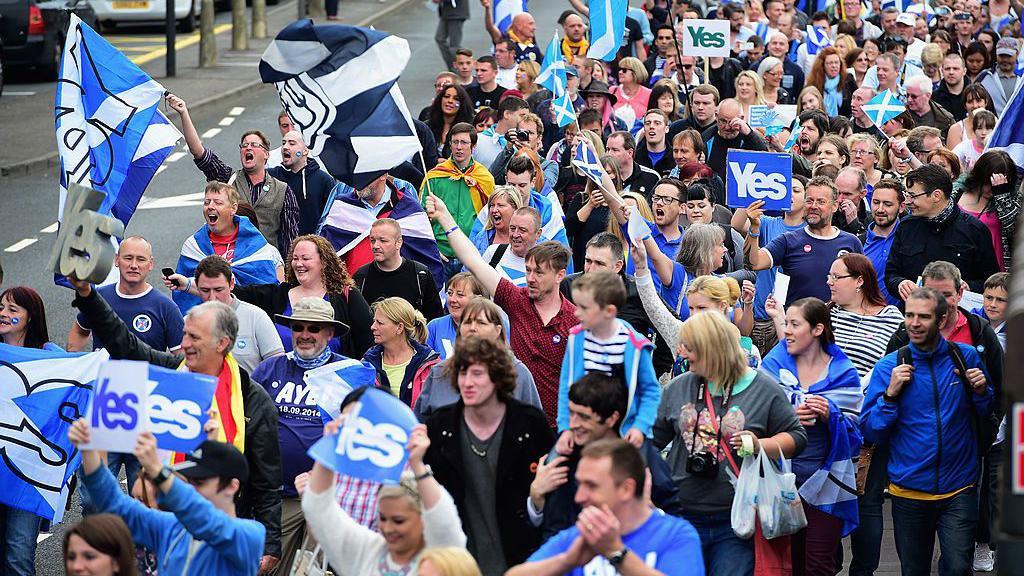
Campaigners march ahead of the 2014 referendum
- Published
Holyrood is back for the final parliamentary term before next year's Scottish elections.
It feels like politics has been locked into campaign mode since before last summer's general election, but we really are on the final straight now.
And it's becoming clear that independence is going to be a central pillar of the SNP's platform.
John Swinney has been ramping up the rhetoric throughout the summer, and chose to mark the start of this new parliamentary year with a speech on Scotland's "right to decide".
Is this a sign that the constitution will once again be taking top billing as we head towards the polls?
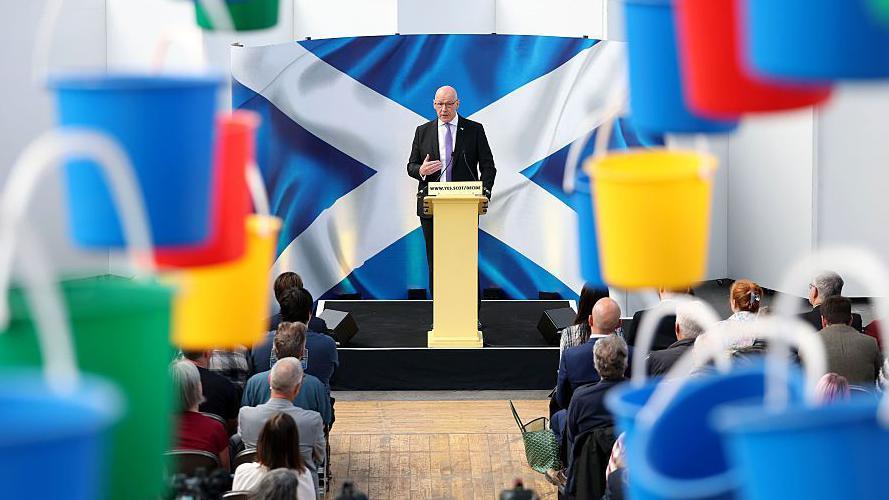
John Swinney marked the new parliamentary year with a speech on independence
A lot has happened since the last referendum in 2014, when Scots voted by 55% to 45% to remain part of the UK.
And through it all, the question has never really gone away.
There was Brexit in 2016, which led Nicola Sturgeon to say a referendum was "highly likely".
There was a pandemic which saw support for the then first minister and for independence peak; she actually set a date at one point, only for it to come and go with no vote.
There has been a remarkable period of turbulence at Westminster, with six prime ministers in eight years.
Almost all of them were asked about independence by the first minister of the day; almost all repeated some form of Theresa May's mantra, "now is not the time".
Sir Keir Starmer is the latest to say there will not be a referendum during his tenure, insisting that it is not a priority either for the public or his government.
The campaign of 2024 which swept him into Downing Street might have been the point where there was the least emphasis on the constitution - but it was still page one of the SNP's manifesto.
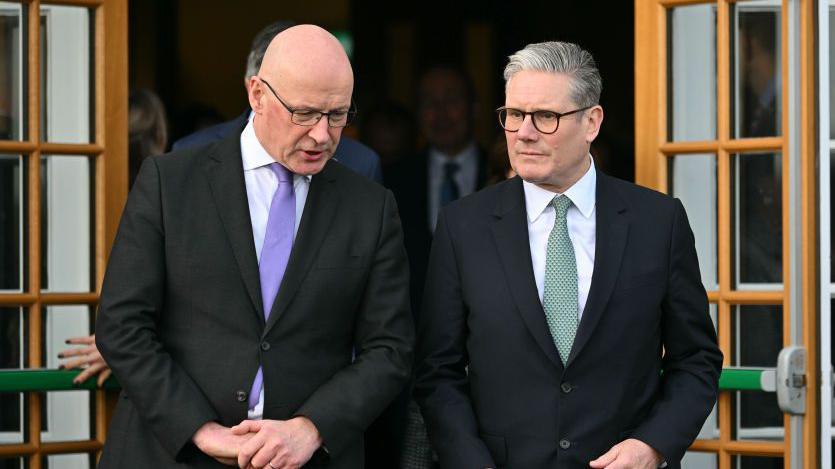
Sir Keir Starmer is the latest prime minister to rule out a vote on independence
So perhaps there's nothing new in the SNP banging the drum for independence.
But it does seem like the party is talking about it with renewed vigour of late, as it recovers from its own rollercoaster period of leadership changes and a hammering in the general election.
It makes sense, from a pragmatic point of view. Independence remains popular in the polls - more popular than the SNP.
With the party retaining the bulk of its support among those who voted Yes in 2014, it makes sense for them to lean into it.
Swinney has also been clear that he would prefer to focus on the "why" of independence, rather than the "how".
He doesn't want to get bogged down in complicated questions of process, but to major on the arguments in favour of independence, of winning people over to the cause.
Break the deadlock
Swinney sees plenty of those arguments in the current state of the nation, from the economy to the debate on immigration, and the rise of Reform UK.
But ultimately he is never going to escape the questions about "how".
Because we have heard the arguments about "why" so comprehensively over the past 12 years.
Particularly in the political bubble, people want to know what's next, what new idea there is to move things on.
It's fair for Swinney to point out that there are questions for the UK government and the unionist parties, if they ignore parliamentary majorities and democratic mandates.
But as the biggest party agitating for a change, people also want to know what the SNP is going to do to break the current deadlock.
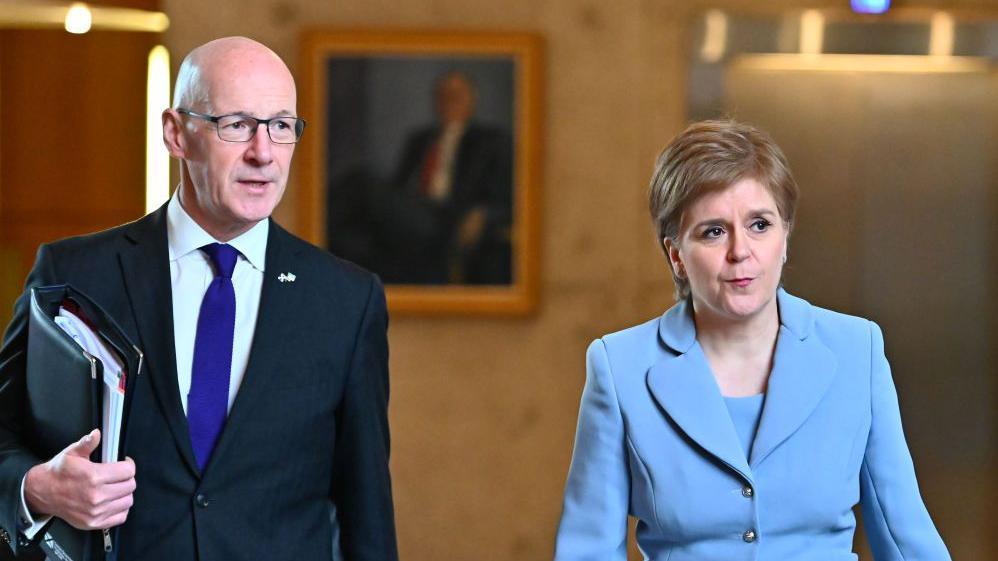
Nicola Sturgeon tried various approaches but never secured a second referendum
It was a question which vexed Swinney's predecessors.
Sturgeon asked the Supreme Court whether Holyrood could set up a referendum on its own; the answer was a resounding "no".
The former first minister flirted with the idea of a "de facto referendum", using an overwhelming election victory as a mandate for negotiations to end the union.
But she has since described embracing that language as one of her biggest mistakes.
Swinney instead is falling back on the example of another predecessor.
He has been clear that an agreed and internationally recognised referendum is the only way to actually deliver independence.
And he has been equally clear that the way to secure that referendum is via an SNP majority at Holyrood.
Strongest case for referendum
He points to the precedent of 2011, when Alex Salmond won 69 of the 129 seats at Holyrood, leading to the vote in 2014.
It is a high bar to set, so there will be some debate about this within the Yes movement.
That will come to the fore at the SNP conference, where some activists want to try to amend the motion endorsing Swinney's plan to install a more radical one.
Other pro-independence parties are also keen for any mandate to be on a cross-party basis, because they don't want the SNP to hog all the seats.
Ultimately Swinney will most likely take the pragmatic route. He will campaign on the basis of wanting an SNP majority to make the strongest possible case for a referendum.
But it has always been his position that a pro-independence majority should be enough to secure a referendum. So should that be the end result, he will still seek to put pressure on UK ministers to respect the will of the Scottish Parliament.
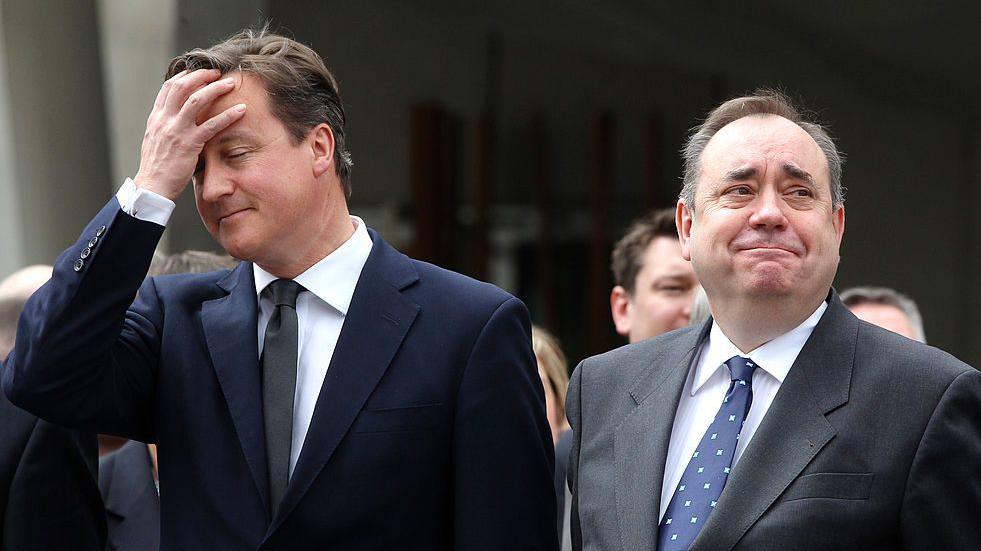
Alex Salmond won an SNP majority in 2011 and secured a referendum from David Cameron
So will the election end up being dominated by independence?
Swinney might hope so, and indeed some of his unionist rivals might too.
The Conservatives are desperately seeking a way to fend off Reform UK.
Given that their revival at Holyrood was built on opposition to independence, they would love to dust off the "no to indyref2" placards once again.
But ultimately elections are about what the electorate wants.
And this is where politicians need to tread carefully.
On the one hand, the likes of Scottish Labour may be desperately keen for the topic to be put on the back burner - or spirited out of the kitchen entirely.
But when polls continue to show the nation essentially split on the question, it isn't going to completely go away.
On the other side, the SNP has to take the Yes movement seriously and not just treat it as an easy bank of votes.
Distraction from day job
During Sturgeon's time in charge, supporters of independence were repeatedly marched halfway up the hill to a referendum before being stood down.
Swinney needs to give them a good reason to back him en masse if he has any chance of building a majority.
But he also needs to be careful to maintain a balance between the constitution and more everyday issues.
After all there is a difference between half of the electorate picking Yes in a poll of future voting intentions and them putting independence top of their list of priorities.
Swinney has insisted that he is laser-focused on the priorities of the people of Scotland - eradicating child poverty, making public services like the NHS sustainable, growing the economy, and tackling the climate emergency.
But the Tories and Labour immediately pounced on his speech to suggest that independence is distracting him from the day job.
There was a case study in the fact that Swinney's speech took place at the same time as his social justice secretary was doing an event promoting the government's interventions to tackle poverty.
Eradicating child poverty, after all, was meant to be his number one priority.
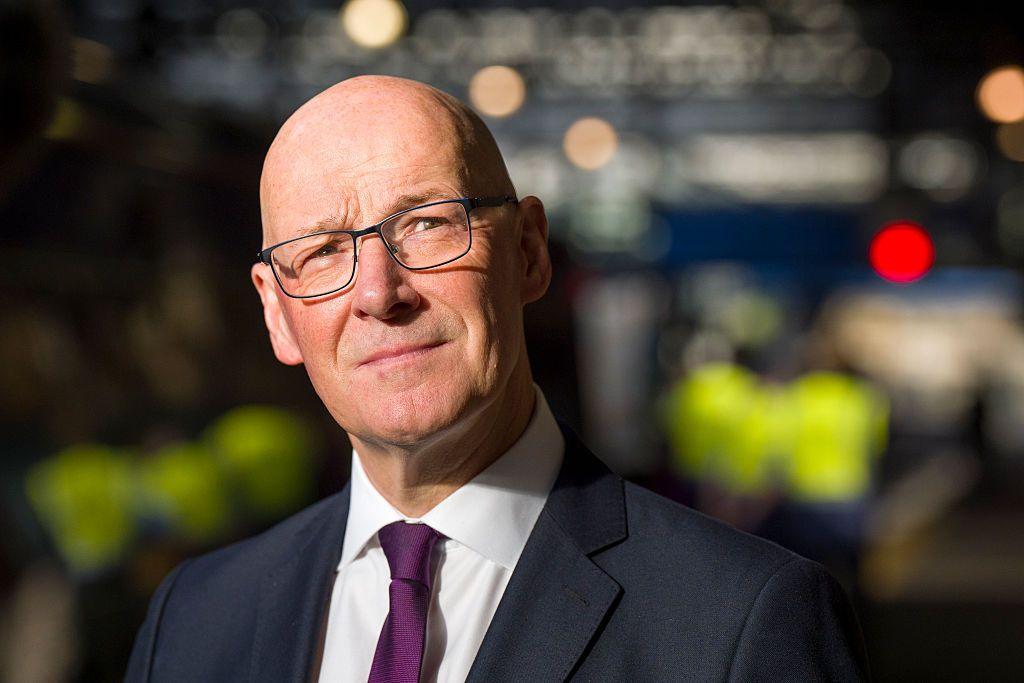
Swinney is Scotland's longest-serving elected representative
There are plenty of other issues which are at the forefront of the public mind; the state of the health services, the cost of living, poverty, housing.
A number of recent, external polls, external have suggested the issue of independence is far more important to SNP voters it is than to the country at large.
But ultimately the party reckon they can link them.
When it comes to the economy, for example, they argue that other small independent countries are thriving, in comparison to the UK's post-Brexit performance.
Thus they argue that independence isn't a distraction from building economic growth - it's the necessary route to it.
And then the unionist side dig out the latest Gers figures and cite spending per head of population, and we end up having a rather familiar debate.
You can kind of see why people tend to want to hear something new, something which can move this on in a decisive way or put it to bed entirely.
One final element in all this is Swinney himself.
The first minister is Scotland's longest-serving elected representative, having been an MP and then MSP since 1997.
Realistically, he isn't going to get many more shots at moving the needle on the issue which got him into politics in the first place.
So of course he's going to throw everything he's got at it. It's go big or go home.
The scene is set for quite a contest running up to May 2026.